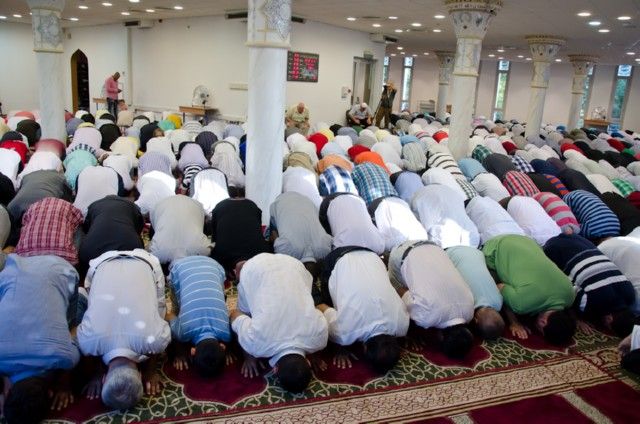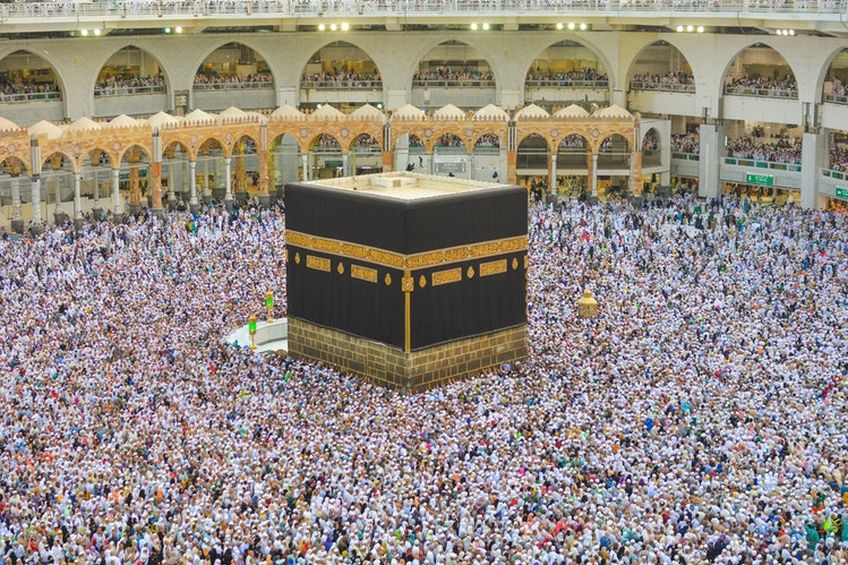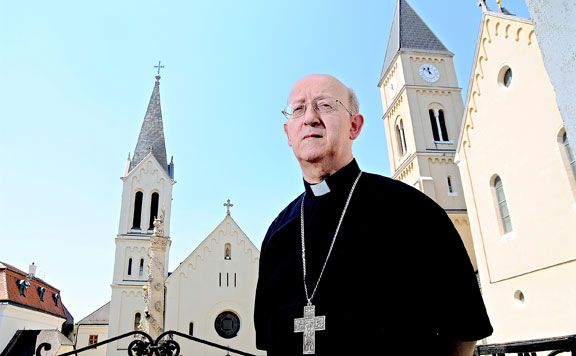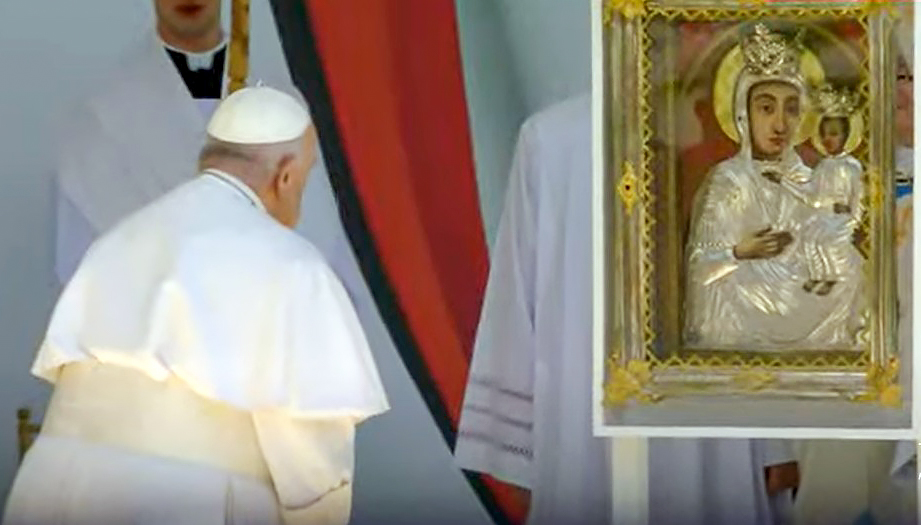There are primitive religions in which there is no connection between the practice of religion and everyday life. The believer says a magic prayer or presents some kind of sacrifice, and then calmly lies, steals, cheats, fornicates, or even murders, in the knowledge that he has committed his god to him, that he will protect him.
Islam represents the other extreme. Almost every step of a Muslim man - from sunrise to sunrise - is determined by his religion. Voluntary determination, some kind of creativity or even love stemming from free will hardly play a role in his religious practice. The Islamic kolkhoz religion, the ideal of which is a uniformed, "true-believing" person who fits into the crowd and stands in line. At the top of the virtues is not love - which presupposes freedom - but faith and the unconditional obedience that comes from faith. Obedience is facilitated by the imam's (or ayatollah's) suggestive preaching, which is certainly capable of fanaticizing the faithful.
However, we cannot say that the main commandment formulated by Jesus is not valid in Islam. "Love the Lord your God with all your heart, with all your soul, with all your mind and with all your strength" - "Love your neighbor as yourself!" (Mark 12:30-31). Actually, they accept the so-called golden rule: "What you want people to do to you, do to them!" (Matthew 7:12).
The problem is that not everyone fits into the concept of "people" or "neighbor". Kafirs (non-Muslims) do not fit here, nor do slaves and (in the full sense of the word) women. A kafir can be mocked, deceived, even killed, a slave woman can be considered a sexual pleasure item, and a wife can - in some cases - be beaten.
Of course, "politically correct" experts - when discussing Islamic ethics or morals - forget these facts in an eye-rolling way. – Of course, we cannot claim that a Muslim cannot be a benefactor or even a good friend of a Christian, but it is certain that neither the Koran nor the Sunnah encourage him to do so. "Believers should not accept unbelievers as friends instead of believers! Those who do this will lose Allah's protection" (K 3,28; cf. 4,144).
Surrender to Allah
This is what the word "Islam" itself means, at least in its first interpretation. (The second is "conquest".) - This conquest is in harmony with the first part of the Great Commandment, and the first three commands of the Ten Commandments. - Worship before Allah requires the so-called maintaining the requirements of five columns. These include zakat, almsgiving, because this is also an expression of self-surrender to Allah.
Shahada = confession of faith
Its official text reads: "I bear witness that there is no God but Allah, and Muhammad is His Messenger." Every father whispers this phrase into the ears of his newborn child, and the goal is for the dying to hear it as the last word. This must be recited at the end of every obligatory prayer. And if someone converts to Islam, his acceptance (or, as Muslims say: his re-acceptance) also takes place by reciting this confession of faith.

Source: islam.com
Sazlát = prayer five times a day
This is a precisely developed prayer, the times of which are: sunrise - noon - afternoon (between noon and sunset) - sunset - evening (a few hours after sunset). Location: the mosque. If it is not possible to go to the mosque, any location that is not considered impure is suitable, but in this case it is recommended to use a prayer rug. - Before the prayers, ritual washing must be done with clean water, which can be replaced with sand if necessary. (Water-scarce Arabia and the Sahara abound in this...) - The muezzin calls the faithful to prayer from the minaret next to the mosque or integrated with it. (Nowadays the muezzin can be replaced by a speaker). Turning towards Mecca is obligatory, as is joining the community, if this is possible. The prayer is led by the imam, whose role can be filled by any Muslim man.
Each prayer consists of a specific number of units (rak'ahs).
2 rak'ahs in the morning, 3 rak'ahs in the evening, 4 rak'ahs each at midday, afternoon and after sunset. At each rak'an, the takbeer is said: Allahuakbar! (Allah is the most powerful), the fatiha (the first surah of the Qur'an), the prayer "Glory be to Allah Almighty" along with various Qur'anic quotes and other prayers. - In the meantime, precisely defined movements must be performed, from extending the arms to bending and completely falling to the ground, when several parts of the body must be in contact with the ground (forehead, nose, palms, knees, toes). The location of the main Friday noon prayer is the mosque, the main mosque. The imam's sermon is always delivered during the main prayer, which is usually much more than praising Allah or simply exhorting one to do good. These are often mobilizing speeches with a political theme. It is no coincidence that Julia Gillard, the wife of the Prime Minister of Australia - in defiance of the protests of Muslims and the ultra-liberal media - ordered the wiretapping of mosques in 2016.
Zakat = giving
Since Muhammad, Muslims have always considered it important to pay taxes on their wealth that is in money or that can be determined in money. Zakat is now collected by the state as part of the citizen tax in most Islamic states. The purpose of zakat is to support the poor and sick, spread Islam, support travelers, redeem prisoners, free slaves, etc. The poor whose wealth does not reach a certain level are exempted from paying zakat.
Saum = Fasting in the month of Ramadan
Ramadan: the 9th month of the Muslim lunar calendar, which begins with the appearance of the new moon. It can fall on any phase of our calendar year, so daily fasts are shorter in winter and longer in summer. Every day from dawn to dusk, you must abstain from all kinds of food, drink, sex, and smoking. (Consumption of wine, alcoholic beverages, and pork is also prohibited at other times.) Pregnant and nursing mothers, as well as those with chronic illnesses, are exempt from fasting. By the way, travelers, sick people, and menstruating women can postpone the fast.
By the way, this holy month also encourages the faithful to refrain from all kinds of sins, especially from lying, slandering, and gossiping, to be compassionate towards the needy, to "attune to Allah." Reading and reciting the Koran divided into 30 parts also serves this purpose. There is an opinion that in 30 days heaven is open, hell is closed, and Satan is bound... After sunset, it is natural to eat and drink, but it is recommended to keep a certain measure even then.
After the last day of fasting, the 3-day Eid al-Fitr, the joyous festival, begins with the appearance of the new moon. In such cases, they perform a special salat (prayer), give zakat directly to the poor, and visit relatives and friends with mutual gifts and the consumption of delicious food and drinks.

Source: Wikipedia
Al-Hajj = pilgrimage to Mecca
It is obligatory for all adult Muslims (men and women) to make a pilgrimage to Mecca at least once in their lifetime. Only severe poverty and illness can exempt you from this. For the pilgrimage, 8-12 of the 12th month of the lunar year. takes place between days. The number of pilgrims has already reached 2.5 million in recent years. For Kafirs (non-Muslims) it is strictly forbidden to approach the holy places. By the way, the Hajj is performed according to strict regulations. The main points of the 4-day program:
– Pilgrims perform a ritual ablution already 20 km before Mecca and put on the pilgrim uniform (the same for rich and poor).
- Arriving in Mecca, they enter the haram, a 164x108 m courtyard, which contains the Zemzem well and the (cube-shaped) building of the Kaaba, in the SE wall of which the famous black (meteorite) stone was built. Here they go around the Kaaba 7 times and (if possible) kiss or touch the black stone.
- Then they go up to the nearby Marva and Szafa hills, they cover the distance between them (approx. 400 m) 7 times - recalling the memory of Ábrahám and Hágár (Hádzár = Iszmael's mother).
- They spend the night in Mina, 8 km away - in a well-equipped tent camp, then they make a pilgrimage to the Arafat Valley, 25 km from Mecca, where they stand for a long time to pray and meditate, repenting of their past sins and resolving themselves for a more virtuous future.
– The next night is spent in the Mudzafila valley between Arafat valley and Mina. From there, they go to Mina to "stone" the 3 pillars symbolizing Satan 3 times, each with 7 pebbles. On the same day, the presentation of the animal sacrifice, the ritual haircut and the repeated circumambulation of the Kaaba take place. (Presentation of the sacrifice is now practically done by making a payment at the huge slaughterhouses. Pilgrims can also eat the meat of the sacrificed animals, but most of it is frozen and goes to the poor Muslims of the world.)
– They spend the third night in Mina again, and then on the 4th day they go around the Kaaba a third time. This ends the official part of the pilgrimage. But those who can, also go to Medina to pray at Muhammad's tomb.
Each pilgrimage involves several deaths, but Muslims "don't give up". The point is that they have fulfilled the requirement, experienced the power of the crowd (umma) gathered from all over the world, and can wear the badge of honor "hajji" (feminine version: "hajja").
Gyula Márfi












